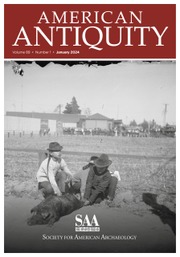Article contents
On “Capturing Facts Alive in the past” (Or Present): Response to Fotiadis and to Little
Published online by Cambridge University Press: 20 January 2017
Abstract
Michael Fotiadis (1994) and Barbara Little (1994) both question the oppositions that structure current debate about the “objectivity” of archaeological science; they raise concerns about my own proposal for a “mitigated objectivism” where it reaffirms these oppositions. I welcome their discussion and offer three responses to clarify and situate my own position. Most valuable, they identify several lines of inquiry that should be pursued beyond the philosophical analyses I have developed, in this instance of gender research.
Resumen
Michael Fotiadis (1994) y Barbara Little (1994) cuestionan las oposiciones que estructuran el debate actual sobre la “objetividad” de la ciencia arqueológica; ellos muestran preocupación sobre mi propuesta de un “objetivismo mitigado” donde se reafirman estas oposiciones. Su discusión es bienvenida y ofrece tres respuestas para clarificar y situar mi propia posición. De mucho valor es su identificación de algunas avenidas de investigación que deben ser seguidas más allá del análisis filosófico que yo he desarrollado, en este caso la investigación sobre género.
- Type
- Comments
- Information
- Copyright
- Copyright © The Society for American Archaeology 1994
References
References Cited
- 10
- Cited by


